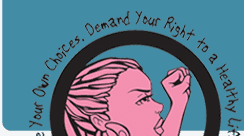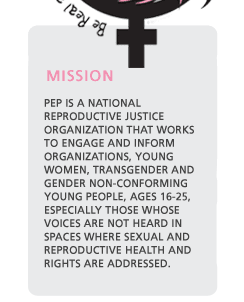Working this summer as the Reproductive Rights Activist Service Corps intern at the Pro-Choice Public Education Project (PEP) gave me valuable experience after valuable experience. Most recently, I was able to go to the first ever United States Social Forum, which was my first experience at a social justice conference of that size and magnitude. In between dodging the pamphlets constantly being thrown in my face, running between hotels and tents, and trying to stay cool, I served as a fly on the wall of a new movement.
The sheer number of workshops being offered - 900 - combined with the number of participants - 7,500 - was enough to be overwhelming. Browsing through the workshop schedule the first night I came across topics ranging from environmental justice to movement building, disability rights, socialism, anti-racism and class struggles. I marked the workshops I wanted to attend - those centering on reproductive justice, LGBTQ rights, and feminism. Then came a somewhat painful elimination process. I justified my choices by picking one having to do with each topic. This is where my most enlightening and obvious lesson of the conference stemmed from.
A common refrain of social justice activists is �all of our oppressions are interconnected�, and so each workshop incorporated many more issues than the one that appeared in the title. My reaction to this focus on interconnectedness varied according to context- sometimes I embraced it, sometimes I rolled my eyes, sometimes I debated the reality of its existence.
At this particular moment in time, I feel that the existence of the United States Social Forum marks an important and concrete shift in the way we approach the many facets of social justice. I don�t have the perspective of many of the attendees at the conference that comes from years of experience working for social justice, but I could tell by measuring their excitement and enthusiasm about what was going on that it represented something monumental.
The best workshop I attended was �Sexuality and Gender: The Body as a Site of Colonization and Liberation,� put on by Southerners on New Ground. By the time the facilitators were making their introductions, participants had packed the room, sitting in chairs, in the aisles, and standing pushed up against the wall. As more and more people attempted to enter the entirely overfilled room, an executive decision was made to hijack the larger room across the hallway. By the time everyone was resettled in the bigger space, that room was packed to capacity as well. First we started by defining neo-liberalism and colonization. We then examined different systems that colonize our bodies and the institutions used to do so. Within this context, we addressed the oppression of prisoners, people with disabilities, young people, immigrants, transgender people, people of color, women, and queer people.
What followed was a very engaging discussion that was rich with different voices, experiences, and concerns. The word solidarity was mentioned again and again. This time, unlike many other instances throughout the conference, I was not left wondering how all of these unique experiences were related, how one story was pertinent to another. Every single body packed in that room had been occupied, shaped, or controlled by a force outside of itself. It didn�t matter if we were talking about patriarchy, white supremacy, racism, capitalism or consumerism; we were all victims of a hierarchy of power that placed value judgments and restrictions on our mobility, access, and desire. We were examining the result of someone saying that one body is more valuable than another.
Just as systems of power make one body more valuable than another, the social justice movement sometimes says that one cause is more important than another. Just as our bodies are fragmented by oppression, so is our movement. Just as we need to regain a more holistic view of our bodies, to rectify the separation between the mind, body and spirit, we must find ways to create a more connected social justice movement.
We cannot expect to progress to a more just society as long as everyone believes their own cause is more important than the rest. This brings me back to solidarity. What is solidarity? What is collectivity? I�m not sure that I�ve figured that out yet, but I think that approaching social justice issues from broader, more inclusive frameworks helps to address the root causes of injustice and understand how justice for one means justice for all of us.
| 





